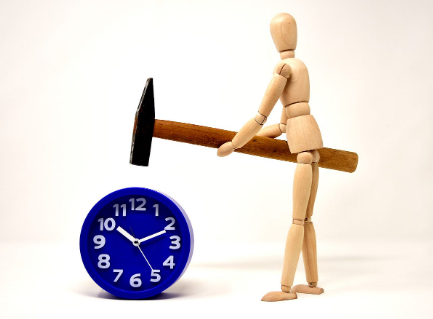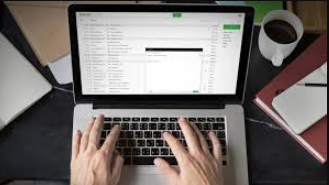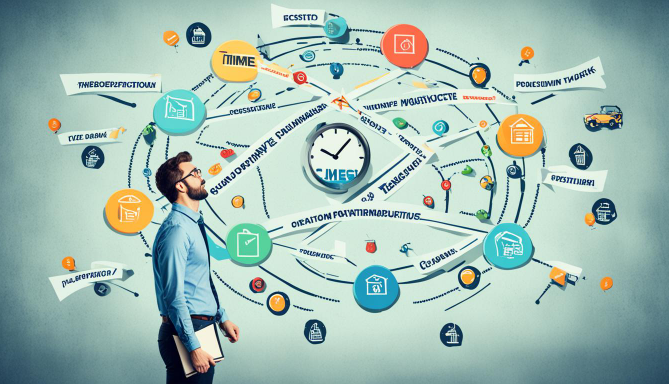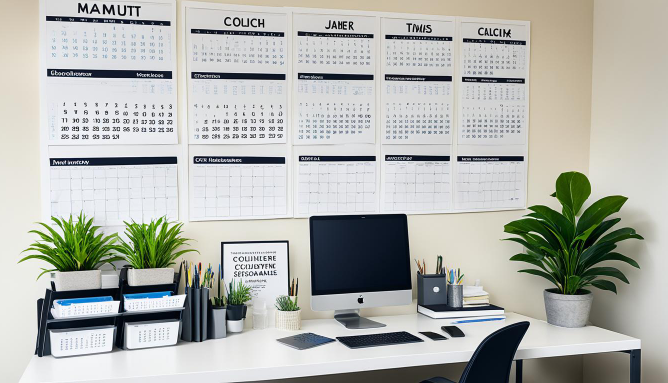In today’s world, we face many tasks and challenges every day. This makes our responsibilities never-ending. However, some time-wasting habits sneak into our lives without us knowing. These habits make us less productive at work. They range from procrastination to being too connected to our smartphones. They don’t just slow us down; they also stress us and make us feel like we’re failing.
Procrastination is tough to beat, affecting many of us. Multitasking might seem like the answer, but it actually slows us down and makes us make more mistakes. In a world full of technology, we often use multiple tools to get things done. However, not using these tools efficiently is a common misstep.
Setting goals is key because without them, we tend to waste time. This can hurt our future success. Juggling too many tasks can tire us out and make us lose focus. And not being clear on what to do wastes time and reduces our work quality.
Useless meetings cost companies a lot – about $37 billion a year. Social media and messy workspaces make things worse. This is why it’s so important to spot and stop these productivity killers.
To make the most of your workday, getting rid of these bad habits is very important. You can learn some great tips for being more productive by checking out this guide.
The Myth of Multitasking
Multitasking is common at work today. Yet, it’s not as helpful as many think. In 1965, an IBM report first talked about multitasking. It showed off a new computer’s skills. But remember, doing many things at once can lower your work quality.
Why Multitasking Hurts Productivity
Multitasking can make a task take 40% longer. A study from Stanford University found that those who are proud multitaskers do worse on their tasks. They make more mistakes and remember fewer details. This points to a bigger issue.
In the past, “priority” was always singular. It meant the most important thing. But in the 1900s, it became about handling many important things at once. People think they’re managing well by doing many things. But science shows this isn’t true.
People who do a lot of multitasking have trouble focusing. They also find it hard to ignore unimportant things. This affects how they remember and process information. All of this can make their work less accurate and take longer to finish.
How to Focus on Single Tasks
To get better at single-tasking, start small. Set aside time to focus without interruptions. For example, check your email or use social media at certain times only. Stick to one task from start to finish. This approach helps you improve your focus and get more done on time.
For a significant change, try making one task your top priority each workday. Pay close attention to this task only. This ensures you do everything with care and get good results.
Working from Your Inbox
Emails are key for work, but checking them too often can be a big problem. It can make us react to things instead of focusing on important tasks. To stay productive, set times just for emails. This way, work time doesn’t get eaten up by email responses.
Setting Boundaries with Email
About 25% of people spend an hour daily just on their inbox. This can make work less efficient. Setting firm times for checking email can improve things a lot.
It’s wise to turn off email alerts. They disrupt workflow, and it takes about 23 minutes to refocus after. Also, try not to check email all the time. It can drain your energy.
Using the Pomodoro Technique can be a great help. This method assigns chunks of time just for emails. Not only does this keep you focused, but it also avoids sending too many emails, which can overwhelm others.
It’s also smart to move important tasks from emails to a to-do list. This clears up your inbox and makes sure nothing vital is missed. Keeping a clean and organized inbox can boost your productivity at work.
The Importance of Delegating
Delegating well is key to making work better and achieving business goals. A study found that top CEOs delegate a lot. This helps their companies grow quickly and make more money. Compared to leaders who do everything themselves, those who delegate well see better business growth.
When you’re good at sharing tasks, it helps with managing workloads. It also builds trust at work. Leaders who are skilled at delegation have teams that work together well. This teamwork leads to more creativity and better skills. It creates a happy work environment focused on new ideas and working together.
Good delegation also helps leaders have a balanced life. Without trying to do everything alone, they avoid getting tired and can focus on what they do best. This makes them more efficient at work. Figuring out what to hand off to others is key to being more productive.
However, not sharing tasks can cause problems. Employees might not feel like they can take the lead. This could slow down progress and create unsafe situations at work. But if they feel their boss trusts them, they’ll work harder and care more about their job.
Teaching someone else a task might seem hard at first. But this actually helps things get done more efficiently in the long run. Understanding this leads to a happier, more productive workplace. Delegation and sharing tasks wisely are important steps towards success.
The Power of Saying “No”
Saying “no” saves time and energy while keeping us on track with our goals. It shows we value our time by not spending it on things that don’t matter. Warren Buffett also reminds us to set boundaries to protect our time. This way, we focus on what’s important.
Many people say yes because they don’t want to seem rude. But, every yes means less freedom to choose how we use our time. It’s key to focus on tasks that really count.
In “The Art Of Saying NO,” Zahariades highlights that taking care of ourselves comes first. We must say no to protect our time from those who don’t add value. It helps us avoid getting overwhelmed.
Studies show that setting clear boundaries early in life is good for us. It teaches us to know ourselves and say no when needed. This leads to a better focus for working professionals, reducing busywork.
The “Hell Yeah or No” approach helps us choose what to say yes to. It makes us think about the impact of our choices on our future time. Saying no now saves us from hard decisions later, making us more efficient.
To sum up, being assertive at work by saying “no” helps us achieve more and feel better. It’s all about choosing our tasks wisely and cutting out what doesn’t help us grow.
Importance of Tracking Results
In today’s fast-paced world, it’s vital to track our results. This helps us spot unproductive habits and make smart changes. When we measure our progress, we can focus better on what we need to do.
Top Productivity Apps
Productivity apps are great for keeping track of our time and tasks. They show us areas where we can do better, for both work and personal goals. Apps like Todoist, Trello, and RescueTime are very popular.
They help us organize our work and see how we use our time. This makes us work better day by day. It also helps us achieve bigger goals over time.
Benefits of Regular Tracking
Tracking regularly helps us see what’s working and what’s not. It makes work more rewarding by celebrating the good and fixing the bad. Over time, you can learn when you waste time the most.
This lets you plan better for using your time wisely. It makes work less stressful. By managing time well, tasks feel easier to do too.
Studies have found that tracking goals boosts success. It works for things like losing weight or building new habits. Even with a busy life, you can stay consistent by using tracking methods.
So, by tracking our progress, we work better and feel more accomplished. This leads to happiness in our personal and work lives.
Taking Breaks to Boost Efficiency
Many think working without breaks makes you work better. But studies show taking breaks is key. The top 10% of workers rest for 17 minutes after 52 minutes of work. This fits with how our brains work. Our minds work best for about 90 minutes straight. After that, we need a break.
Walking in nature makes you 20% more focused and less stressed. Even short breaks, like 27 seconds, every 40 minutes can boost productivity. Surgeons became seven times more accurate when they started taking microbreaks.
Power naps for 10 to 20 minutes boost your energy. A “nappuccino” - an espresso followed by a nap - can make you alert. Athletes know that good rest is vital for their success.
Taking breaks can make us better at our jobs and happier. It helps us avoid getting too tired, which is good for our work and life. These tips are proven to work, helping us find balance between working hard and resting. This leads to a more successful and healthy life.
Establishing a Consistent Work Routine
Creating a work routine is crucial for better productivity. It boosts your thinking skills like focusing and making smart choices. It also helps you use your time well and switch smoothly between tasks.
Not eating breakfast can make you think less clearly and work not as well. This highlights why having a good breakfast is important for your brain. Also, doing activities like running or walking fast in your daily plan can make you feel more energized and happy. It starts your day on a good note.
Using ways to manage your time, such as time blocking, the Pomodoro method, and Getting Things Done, can make you more productive. They help you focus by keeping you from doing many things at once and by working deeply. Though it’s easy to get distracted, turning off alerts and using tools that track your productivity can help you stay on track.
Methods like the Eisenhower Matrix are great for deciding what tasks should come first. They help you see what needs your immediate attention, what’s important but not pressing, and so on. Also, creating set times for work and time off, and not using screens after work, is good for your health and making sure work doesn’t take over your life.
A consistent routine also leads to a work and living space that’s neat and organized. This makes you feel more at ease and less stressed. Doing a bit of cleaning each day stops you from feeling like the job is too big. A tidy place makes it easier to think clearly and not get too tired from making too many decisions.
In a nutshell, having a usual routine is crucial for using time well, focusing, and being in good mental shape. This helps you have a life that’s more effective and satisfying.
Avoid Overloading Your To-Do List
Too many tasks can make you feel overwhelmed. It can also make you think you’re not being productive. But, you can avoid this by managing your list strategically. This means being realistic and picking tasks that you can really do every day.
How to Prioritize Tasks
Picking the right tasks to do first is key. You should sort your tasks by what’s most important and what’s most urgent. This way, the most critical tasks get done first. It helps you achieve more and feel less stressed, making your work smoother.
The Eisenhower Matrix is a great tool to use. It divides tasks into four types. This makes it easier to set goals and manage your to-do list better.
Managing Your Daily Goals
Setting clear goals every day helps a lot. It lets you focus on what’s really important. Plus, it helps you avoid taking on too much. When you set aside time for specific tasks, you can work on them without stress.
It’s also good to look back on your day’s work. This means checking what you did and what still needs to be done. This routine can make you more productive and make you feel good about what you’ve accomplished.
By managing your to-do list well and setting smart goals, you’ll find your days more productive and rewarding.
Disconnection: Reducing Digital Distractions
Today, it’s easy to always be online. But, spending too much time on email and social media can hurt our work. It makes us less productive and not as into what we’re doing. So, taking breaks from our digital devices is key to stay focused.
Researcher Larry Rosen tells us to use our devices less. We can do this by turning our phones off sometimes. He also says we should not check social media while working. This kind of plan helps keep our minds fresh. The Pomodoro method is one example, where we work for 25 minutes, then take a short break. This can really help us stay on track.
Some apps can help, too. Forest makes it fun to focus by letting you grow a tree whenever you avoid your phone. It also helps plant real trees. Apps like Stay Focused and browser extensions like Leech Block can also keep us away from sites that distract us. Using these tools can make us much better at avoiding digital distractions.
Practicing mindfulness and meditation can also make a big difference. They help us focus better and not get so lost in our devices. In busy workplaces, it’s hard to stay focused with so many messages. But, taking time to step away from our devices helps us work better, with more meaning.
To really cut down on digital distractions, the culture at work needs to support deep, meaningful work. There are online courses, like the ones from HBR Learning, that can help. They teach us to use technology better. Setting rules for when we check our devices and having digital-free zones at work can make us all happier and more productive.
Understanding the News Reading Habit
News is now a key part of everyone’s day. But, too much news can hurt our focus and make us stressed. Many Americans feel this stress from the constant flow of bad news.
Watching sad or scary stories on TV can make us feel down. Our brains like to focus on the bad things. Even if we say we like happy news, we often choose the sad stories.
The news can also split people because of their politics. In the U.S., Democrats and Republicans don’t trust the same news. But in Germany, most people trust one news source, ARD.
To deal with the negative effects of news, experts have some advice. They say pick only the best news sources and set times for updating yourself. This can make how you get your news much better.
Checking the news just once a day and not before bed is good for your mental health. Mixing the news with fun things like music or exercise is also smart. It makes how you deal with the news better.
Most people read news online by going to news websites. They also use social media a lot. Knowing this and being mindful of how you read the news can make you happier and more balanced.
Conclusion
Time-wasting habits are a big obstacle to avoid. First, you need to know if you have them. Then, you must choose to do better. By ditching things like trying to do too many tasks at once, or spending too much time sorting emails, you’ll get more done. This makes your work life smoother. Plus, you’ll feel better about what you’ve accomplished at work and in your free time. Make sure to set goals, plan with care, and share tasks with others. These simple steps can really change how you go about your day.
Managing your time well isn’t just about doing lots of things. It’s more about picking what’s most important. Tools like lists and planners can help keep you on track. They guide you to pay attention to the tasks that really matter. By beating habits like putting things off and wasting time, you open the door to get more done. These efforts help good habits to grow in your daily life.
Little changes can make a big difference. Things like starting work at a regular time, setting a plan, and tackling tough jobs head-on are key. Remember, keeping an open mind is crucial while you get into these good practices. Over time, you’ll see yourself getting a lot more done. You’ll also find time for other things that matter to you. It’s about creating a life where you succeed at work and live fully.
FAQ
Why does multitasking hurt productivity?
Multitasking means switching tasks a lot. This breaks your focus. Studies find it takes over 23 minutes to get back into a task after a break. Doing one task at a time makes you more efficient.
How can I manage my emails without being constantly distracted?
Set times to check and reply to emails. This stops you from being interrupted all the time. It helps you focus on bigger tasks.
What are the benefits of delegating tasks?
Giving tasks to others can stop you from getting too stressed. It makes things run smoother and lets you work on the big stuff. It also makes your team more productive.
How does saying “no” help maintain productivity?
Saying “no” saves your time and energy for what matters most. It stops you from doing too much. You can do your best work and stay well personally.
Why is tracking results important for productivity?
Keeping track of what you do helps you see what’s not working. Apps can show you where to fix things. This leads to better ways to work and more success.
How do scheduled breaks boost work efficiency?
Take a break after focusing for about 90 minutes. This helps you rest and get ready to work better. It’s proven to make you do your job more efficiently.
What is the significance of establishing a consistent work routine?
A routine gets your brain ready for work. It reduces time between jobs and boosts how much you get done. Having a steady daily plan sets you up for a good workday.
How can I avoid overloading my to-do list?
Put tasks in order of what’s most important and pressing. Set goals that you can actually reach every day. This stops you from stressing out and helps you hit your marks.
How can reducing digital distractions improve productivity?
Turning off alerts, ignoring the phone, and skipping social media during work keeps you on track. By staying away from tech that distracts, you can concentrate and get more done.
How can I manage my news consumption to avoid interruptions?
Choose times to check the news and pick trusted sources. Think about what you read and watch. This keeps news from wasting your time.

More Posts
Weekly Digest for Effective People #4
April 23 to April 29
What Are Time Boundaries and How to Set Them Up?
Allocating proper time blocks for every aspect of your work life is called the process of setting time boundaries. Managing appropriate Time boundaries plays a vital role in achieving your goals. Moreover, an...
Best Task Management Software for Individuals
Managing daily tasks, personal projects, and deadlines can be an overwhelming experience. Task management software for individuals provides a strategic solution to this modern challenge. Designed to streamline and simplify the organization of...
What Is A Task Master? 35 Tips To Impact in Leadership
Wondering what is a Task Master? Managing tasks is not easy. Task management is not a piece of cake. It requires great expertise and skills to do this accurately; otherwise, it can be...



